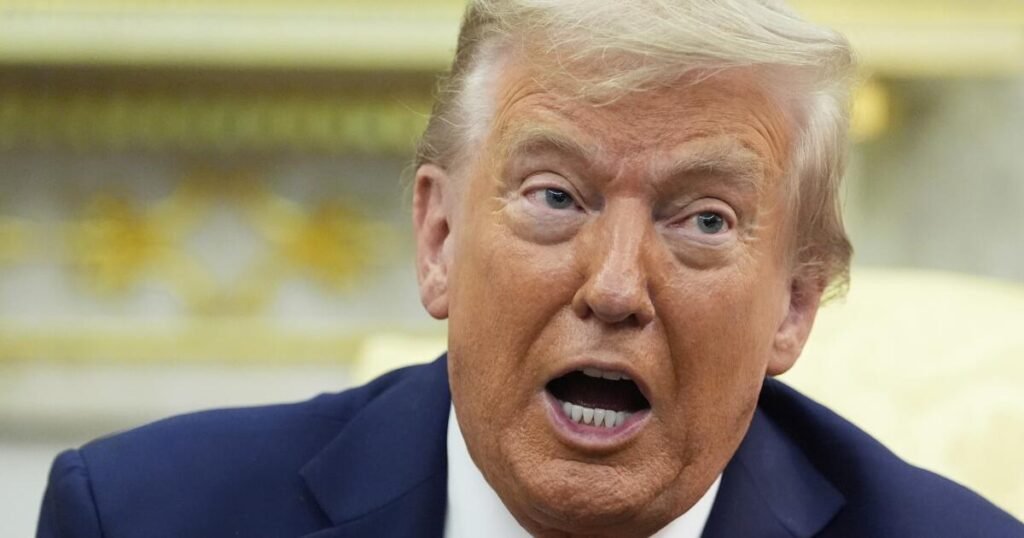Trump’s Lawsuit Aims to Cut Federal Aid Over Cashless Bail Policies
In Washington, President Trump has initiated a lawsuit aimed at reducing federal funding for cities and counties that adopt cashless bail for criminal defendants. This move comes as part of his broader campaign against crime, particularly in the District of Columbia, where he previously deployed the National Guard to maintain order.
His executive orders specifically address the cashless bail practices, with the latest instructing the Department of Justice to compile a list of areas that have effectively removed cash bail, especially for offenses that could impact public safety.
In his remarks, Trump expressed that this shift has coincided with rising crime. He commented, “When someone commits a crime, they can just walk away; they don’t even think twice about it because cash bail isn’t a problem. They’ll be back in a few months—there’s no real consequence.”
He also criticized what he sees as leniency for offenders, saying, “They thought it was unfair to make them pay money for their actions, even if they’ve harmed others.” Trump indicated that this approach is over and done with.
While he doesn’t have the authority to directly alter the DC Act, the administration hopes that placing financial pressure on local governments will motivate them to make legislative changes.
Trump’s second directive could result in decreased federal funding for Los Angeles County, where cash bail is utilized primarily for more severe crimes.
As of October 2023, most misdemeanor or nonviolent felony charges in Los Angeles County will be reviewed by a judge, who may set conditions for release, which could include electronic monitoring or supervision by family members.
“Financial status shouldn’t dictate whether someone stays in jail before their trial or goes home,” as one observer noted.
The county has reached out to clarify how Trump’s orders might influence local bail policies but has yet to receive a reply.
This situation has stirred debate among some communities, with concerns that eliminating cash bail could compromise public safety. In fact, 12 cities in the county allegedly couldn’t halt reforms, leading to spikes in crime and challenges to maintaining public safety. Sheriff Robert Luna mentioned earlier this year that residents were increasingly uneasy about what they perceive as a lack of accountability for offenders.
Neither the Sheriff’s Office nor the public defenders’ office provided immediate responses to inquiries.
The county’s introduction of a zero-bail system during the pandemic aimed to prevent overcrowding in jails. Reports indicated that, despite these changes, re-arrest rates and appearances in court remained relatively constant.
In late 2022, a group of six individuals filed a lawsuit against the county and city, describing their experience as “dark” after they were jailed for five days due to inability to pay bail. They contended that cash bail created a system that discriminates based on wealth. This case resulted in a temporary injunction against enforcing cash bail for individuals yet to be convicted.
In 2018, California Governor Jerry Brown signed a bill to abolish cash bail statewide, but it faced significant opposition from the bail bond industry, which resulted in voters rejecting it in a referendum in 2020, with a notable majority voting against it.
Trump has also called for investigations into acts like flag burning, referring to them as provocations, despite acknowledging earlier Supreme Court rulings that protect such actions as free speech.
These actions align with Trump’s recent enforcement efforts aimed at perceived crime issues in U.S. cities, especially after he dispatched federal forces to Los Angeles and federalized the National Guard in D.C. soon after.
Despite local officials emphasizing that federal intervention wasn’t necessary, Trump hinted at further possible operations in New York and Chicago, stating, “They probably see this as needed.” He further claimed that, without federal support, Los Angeles might have had to cancel the Olympics, emphasizing the need to ensure cities are presentable before the 2028 Games.







